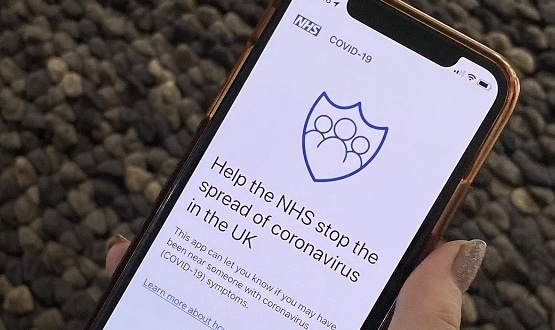The first statistics from the government’s test and trace system have been released – but a roll-out date for the contact-tracing app remains absent.
The figures, published yesterday, revealed a third of people who tested positive for Covid-19 were unable to be reached by the contact-tracing system.
The system currently relies on manual contact-tracing involving a member of the government’s team contacting those who have tested positive and asking them for information about their recent contacts with other people.
The much-anticipated app was designed to speed up the process of contact-tracing, with epidemiologists previously warning manual contact-tracing would be too slow to keep up with the spread of Covid-19.
Between 28 May and 3 June 8,117 people who tested positive for coronavirus had their case transferred to the contact tracing system, Department of Health and Social Care (DHSC) statistics show.
Of those, 67% were reached and asked for their contact and 33% were unable to be contacted.
“The number that were not reached and asked to provide contacts, includes those people who the service has been unable to reach as contact details were unavailable or incorrect or where there has been no response to text, email and call reminders,” according to DHSC.
During yesterday’s daily press briefing health secretary Matt Hancock provided no update on the expected roll-out of the contact-tracing app, just saying that the app would be brought in “when it is right to do so”.
Dido Harding, executive chair of NHS Test and Trace, admitted during the briefing that the system was not at “gold-standard” yet.
When asked by Digital Health News, the DHSC and NHSX could not confirm when the app would be rolled out.
“There has been a hugely positive reception to the app on the Isle of Wight, with more than 54,000 people downloading the app. Their feedback has been invaluable ahead of rolling out the app nationally soon,” a DHSC spokesperson said.
“The app will complement the NHS test and trace programme which is already up and running and helping to save lives.”
A second version of the app was due to have begun testing on the Isle of Wight this week, according to the BBC, but the government postponed the trial.
Ministers are reportedly considering switching to Apple and Google’s contact-tracing technology.
The government’s decision to develop a centralised contact-tracing system has sparked much controversy, with privacy experts and campaigners suggesting Apple and Google’s decentralised approach was more secure.
NHSX chief executive Matthew Gould in April told parliament’s Science and Technology Committee that a centralized approach offered “profound benefits” for tracing Covid-19 without compromising privacy.
At the time he suggested waiting for Apple and Google to release their APIs would delay NHSX’s development of the app. Apple and Google released their APIs on 20 May.
A trial of the original contact-tracing app was launched on the Isle of Wight on 4 May, with an expected country-wide roll-out of mid-May.
Prime Minister Boris Johnson then said the “world beating” test and trace system, expected to include the app, would be in place by June.
The system was officially launched on 28 May without the app. Upon launching the service DHSC said work on the app was continuing following a “positive reception” on the Isle of Wight.
“The app, which will form a part of the NHS test and trace service, is due to be launched in the coming weeks once contact tracing is up and running. It will significantly extend the speed and reach of contact tracing, by helping to identify those who you may not know, such as someone sitting next to you on public transport,” a statement from the department said.

